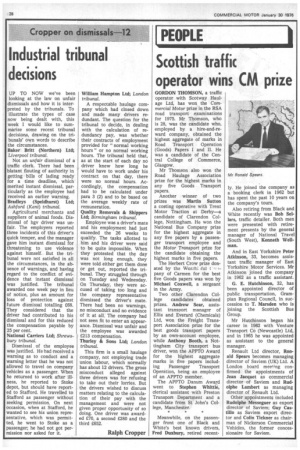Industrial tribunal decisions
Page 30

If you've noticed an error in this article please click here to report it so we can fix it.
UP TO NOW we've been looking at the law on unfair dismissals and how it is interpreted by the tribunals. To illustrate the types of case now being dealt with, this week I would like to summttrise some recent tribunal decisions, drawing on the tribunals' own words to describe the circumstances.
Baker Britt (Northern) Ltd; Liverpool tribunal.
Not an unfair dismissal of a traffic clerk. There had been blatant flouting of authority in getting bills of lading ready for a time deadline, which merited instant dismissal, particularly as the employee had received an earlier warning. Bradleys (Speldhurst) Ltd; Ashford (Kent) tribunal.
Agricultural merchants and suppliers of animal foods. Dismissal of hgv driver was unfair. The employers reported three incidents of this driver's quick temper, and the manager gave him instant dismissal for threatening to use violence against himself. But the tribunal were not satisfied in all the circumstances, in the absence of warnings, and having regard to the conflict of evidence that instant dismissal was justified. The tribunal awarded one week pay in lieu of notice, plus an amount for loss of protection against future dismissal totalling £68. They considered that the driver had contributed to his dismissal and for this reduced the compensation payable by 25 per cent.
National Carriers Ltd; Shrewsbury tribunal.
Dismissal of the employee was justified. He had received a warning as to conduct and a warning letter that he was not allowed to travel on company vehicles as a passenger. When he returned to work after illness, he reported to Stoke depot, but should have reported to Stafford. He travelled to Stafford as passenger without seeking permission. On next occasion, when at Stafford, he wanted to see his union representative, which was permitted, he went to Stoke as a passenger; he had not got permission nor asked for it. William Hampton Ltd; London tribunal.
A 'respectable haulage company which had closed down and made many drivers re dundant. The question for the tribunal to decide, in dealing with the calculation of re dundancy pay, was whether their contracts of employment provided for "normal working hours" or no normal working hours. The tribunal held that, as at the start of each day no driver knew how long he would have to work under his contract on that day, there were no normal hours. Accordingly, the compensation had to be calculated under para 3 (2) and to be based on the average weekly rate of remuneration.
Quality Removals & Shippers Ltd; Birmingham tribunal.
Employee was a driver's mate and his employment had just exceeded the 26 weeks to qualify. The tasks allotted to him and his driver were said to be quite impossible. When they protested that the day was not long enough, they were told either get them done or get out, reported the tribunal. They struggled through on Tuesday and Wednesday.
On Thursday, they were accused of taking too long and the company representative dismissed the driver's mate. There had been no warnings, no misconduct and no evidence of it at all. The company had not seen fit to enter an appear ance. Dismissal was unfair and the employee was awarded £213 compensation.
Thurley & Sons Ltd; London tribunal.
This firm is a small haulage company, not employing trade union labour, which normally has about 12 drivers. The gross misconduct alleged against three drivers was for refusing to take out their lorries. But the drivers wished to discuss matters relating to the calculation of their pay with the management and were not given proper opportunity of so doing. One driver was awarded £70, a second £280 and the third £652.
































































































